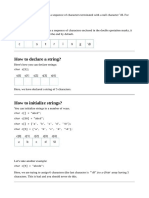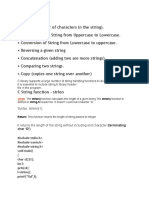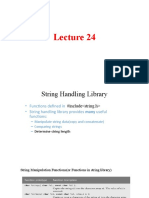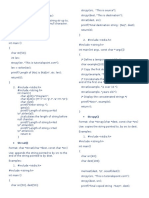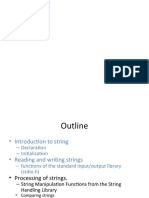0 ratings0% found this document useful (0 votes)
4 viewsUnit - 2 - String Handling Functions(01.07.2021)
The document provides an overview of string handling functions in C, which are defined in the string.h header file. It includes examples of commonly used functions such as strcpy(), strlen(), strcmp(), strcat(), and strrev(), along with their syntax and output. Each function is explained with sample code demonstrating its usage in C programming.
Uploaded by
kothitarun130301Copyright
© © All Rights Reserved
Available Formats
Download as DOCX, PDF, TXT or read online on Scribd
0 ratings0% found this document useful (0 votes)
4 viewsUnit - 2 - String Handling Functions(01.07.2021)
The document provides an overview of string handling functions in C, which are defined in the string.h header file. It includes examples of commonly used functions such as strcpy(), strlen(), strcmp(), strcat(), and strrev(), along with their syntax and output. Each function is explained with sample code demonstrating its usage in C programming.
Uploaded by
kothitarun130301Copyright
© © All Rights Reserved
Available Formats
Download as DOCX, PDF, TXT or read online on Scribd
You are on page 1/ 4
http://www.btechsmartclass.com/c_programming/C-String-Handling-Functions.
html
for examples: https://beginnersbook.com/2014/01/c-strings-string-functions/
String Handling Functions in C
(basic functions)
C programming language provides a set of pre-defined functions called string handling
functions to work with string values. The string handling functions are defined in a
header file called string.h. Whenever we want to use any string handling function we
must include the header file called string.h.
The following table provides most commonly used string handling function and their
use...
1. strcpy() - syntax - strcpy(string1, string2)
#include <stdio.h>
#include <string.h>
int main()
char s1[30] = "python";
char s2[30] = "Java";
/* this function has copied s2 into s1*/
strcpy(s1,s2);
printf("String s1 is: %s\n", s1);
printf("String s2 is: %s", s2);
return 0;
2. strlen() Syntax : strlen(string1) - return - integer
strlen returns you the length of the string stored in array,
#include <stdio.h>
#include <string.h>
int main()
char str1[20] = "Computer";
printf("Length of string str1: %d", strlen(str1));
return 0;
Output:
Length of string str1: 8
3. strcmp() – Syntax - strcmp(string1, string2) – string comparision
Returns 0 if string1 and string2 are the same;
It compares the two strings and returns an integer value. If both the strings are
same (equal) then this function would return 0 otherwise it may return a negative
or positive value based on the comparison.
#include <stdio.h>
#include <string.h>
int main()
{
char s1[20] = "BeginnersBook";
char s2[20] = "BeginnersBook.COM";
if (strcmp(s1, s2) ==0)
{
printf("string 1 and string 2 are equal");
}else
{
printf("string 1 and 2 are different");
}
return 0;
}
Output:
string 1 and 2 are different
4. strcat() - sytax - strcat(string1,string2) -Appends string2 to string1
It concatenates two strings and returns the concatenated string.
#include <stdio.h>
#include <string.h>
int main()
{
char s1[10] = "Hello";
char s2[10] = "World";
strcat(s1,s2);
printf("Output string after concatenation: %s", s1);
return 0;
}
Output:
Output string after concatenation: HelloWorld
5. strrev() - strrev(string1) - It reverses the value of string1
The strrev(string) function returns reverse of the given string. Let's see a
simple example of strrev() function.
#include<stdio.h>
#include<string.h>
int main()
char name[30] = "Hello";
printf("String before strrev( ) : %s\n",name);
printf("String after strrev( ) : %s",strrev(name));
return 0;
String before strrev( ) : Hello
String after strrev( ) : olleH
You might also like
- FICO Blaze Advisor Decision Rules - How It Works100% (2)FICO Blaze Advisor Decision Rules - How It Works44 pages
- WINSEM2021-22 BCSE102L TH VL2021220504672 2022-03-03 Reference-Material-INo ratings yetWINSEM2021-22 BCSE102L TH VL2021220504672 2022-03-03 Reference-Material-I20 pages
- Poornima College of Engineering: Sting, String FunctionsNo ratings yetPoornima College of Engineering: Sting, String Functions22 pages
- Lecture 23 - Strings & String Handling FunctionsNo ratings yetLecture 23 - Strings & String Handling Functions7 pages
- 7228Study Materials of String-Manipulation-lecture 10 by Prof. Alok HaldarNo ratings yet7228Study Materials of String-Manipulation-lecture 10 by Prof. Alok Haldar8 pages
- Edet T. Compiler Construction With C... Efficient Interpreters and Compilers 2024No ratings yetEdet T. Compiler Construction With C... Efficient Interpreters and Compilers 2024423 pages
- How To Scan Objects Into 3D Models W/ Camera For Free: InstructablesNo ratings yetHow To Scan Objects Into 3D Models W/ Camera For Free: Instructables9 pages
- CVE20001 Civil 3D - Point: Description Keys Points Point GroupsNo ratings yetCVE20001 Civil 3D - Point: Description Keys Points Point Groups18 pages
- Chapter 1 Introduction To Information TechnologyNo ratings yetChapter 1 Introduction To Information Technology5 pages
- Laporan Praktikum Keamanan Siber - Tugas 6 - Kelas C - Kelompok 3No ratings yetLaporan Praktikum Keamanan Siber - Tugas 6 - Kelas C - Kelompok 35 pages
- HC 2023 AMD Ryzen 7040 Series Processor 8-26-2023No ratings yetHC 2023 AMD Ryzen 7040 Series Processor 8-26-202327 pages
- An Expert System For Power Plants: Department of Elctrical & Electronics EngineeringNo ratings yetAn Expert System For Power Plants: Department of Elctrical & Electronics Engineering10 pages
- 6.13 Key Terms, Review Questions, and ProblemsNo ratings yet6.13 Key Terms, Review Questions, and Problems7 pages
- Exemplar Adding a calculated table and columnNo ratings yetExemplar Adding a calculated table and column13 pages
- The Analysis of Generative Music Programs PDF100% (1)The Analysis of Generative Music Programs PDF13 pages
- WINSEM2021-22 BCSE102L TH VL2021220504672 2022-03-03 Reference-Material-IWINSEM2021-22 BCSE102L TH VL2021220504672 2022-03-03 Reference-Material-I
- Poornima College of Engineering: Sting, String FunctionsPoornima College of Engineering: Sting, String Functions
- 7228Study Materials of String-Manipulation-lecture 10 by Prof. Alok Haldar7228Study Materials of String-Manipulation-lecture 10 by Prof. Alok Haldar
- Computer Engineering Laboratory Solution PrimerFrom EverandComputer Engineering Laboratory Solution Primer
- Edet T. Compiler Construction With C... Efficient Interpreters and Compilers 2024Edet T. Compiler Construction With C... Efficient Interpreters and Compilers 2024
- How To Scan Objects Into 3D Models W/ Camera For Free: InstructablesHow To Scan Objects Into 3D Models W/ Camera For Free: Instructables
- CVE20001 Civil 3D - Point: Description Keys Points Point GroupsCVE20001 Civil 3D - Point: Description Keys Points Point Groups
- Laporan Praktikum Keamanan Siber - Tugas 6 - Kelas C - Kelompok 3Laporan Praktikum Keamanan Siber - Tugas 6 - Kelas C - Kelompok 3
- An Expert System For Power Plants: Department of Elctrical & Electronics EngineeringAn Expert System For Power Plants: Department of Elctrical & Electronics Engineering















